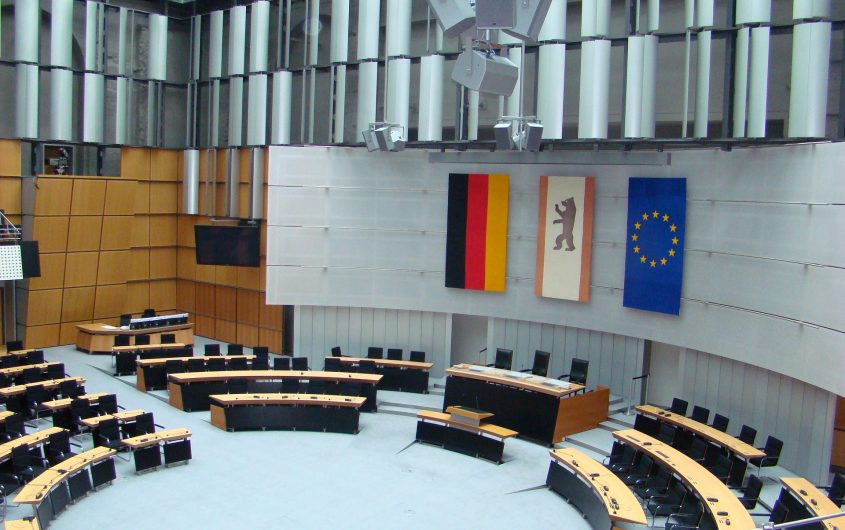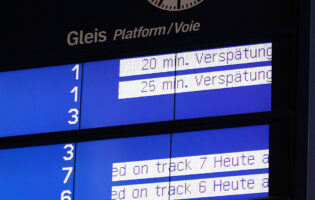
via Pixabay
The Other German Elections

Jack Walter
Georgetown University
Jack Walter is a second-year graduate student at Georgetown University in the Masters in German and European Studies program. He holds an undergraduate degree in International Politics from Georgetown and is currently working at the Danish Embassy in Washington, DC.

Nick Lokker
Georgetown University
Nick Lokker is a graduate student at Georgetown University’s Walsh School of Foreign Service, where he is pursuing his MA in German and European Studies. He has an academic focus on transatlantic security policy and EU-Russia relations. Nick previously worked for AICGS as a research intern during the summer of 2020. His duties included assisting the AICGS president and fellows with research as well as writing for the AICGS website.
Nick's other work experience includes internships with the Center for a New American Security's Transatlantic Security Program, the Center for European Policy Analysis, and the European Parliament. He speaks French, Spanish, and some German and Russian.
Over the last several months, Germany watchers have been fixated on the country’s national elections, the results of which will finally settle the looming question of who will replace Angela Merkel as chancellor after nearly sixteen years in office. Yet this will not be the only vote in Germany on September 26—citizens in Berlin and Mecklenburg-Vorpommern will also go to the polls to choose their state governments. Ahead of these less prominent but still significant state elections, AGI is raising the curtain on what to expect next Sunday.
Berlin
As both the federal capital and one of Germany’s sixteen states, Berlin possesses greater political weight than most cities. Its leader, or ‘Governing Mayor,’ holds equal powers to any one of the minister-presidents in charge of the country’s other states. For the past twenty years, this job has been in the hands of the SPD, first under Klaus Wowereit and most recently under Michael Müller. With Müller’s decision to leave Berlin politics in order to run for parliament, however, the field is clear for a new mayor to take the reins.
At the moment, SPD candidate Franziska Giffey looks set to retain power for her party. After a late surge, the SPD currently sits at 23 percent in the polls, suggesting a solid lead over the second-place Greens at 18 percent. Though such a result would represent a marked improvement for the Greens over 2016, when they came in third place behind the SPD and the CDU, it nonetheless would fall short of their hopes from this past spring, when they peaked at 25 percent in the polls. The CDU has similarly seen a decline in its fortunes as the campaign has progressed, falling steadily from the first-place position it occupied at the start of 2021.
These movements in the polls have largely mirrored those of Germany as a whole, suggesting a certain nationalization of the Berlin election. Events such as a plagiarism scandal that resulted in the revocation of Giffey’s PhD from the Free University of Berlin have failed to sink the hopes of the Berlin SPD, which has largely ridden on the coattails of chancellor candidate Olaf Scholz’s increasing popularity. Bettina Jarasch and Klaus Lederer, the leaders of the Berlin Greens and CDU respectively, have likewise been unable to turn the tides of political decline emanating from the national level.
Nonetheless, the Berlin elections retain a unique local character. A particularly contentious issue concerns whether to expropriate the city’s “mega-landlords,” whose mass real estate purchases have led to a rapid rise in rent prices for a city once hailed as one of Europe’s most affordable capitals. If approved by voters, a referendum on the issue would convert nearly 240,000 apartments into public housing, representing one of the most aggressive reactions to gentrification seen in Europe thus far.
Mecklenburg-Vorpommern
Located in the northeast of Germany, Mecklenburg-Vorpommern has regularly ranked at the bottom of German HDI and GDP ratings since reunification. Although much media attention has been focused on the rise of the AfD in recent years, the state is governed by an SPD-CDU coalition. For the 2021 elections, signs point to a continuation of the status quo, with the main storyline being the further growth in popularity for the SPD. In 2016, the SPD received 30 percent of the vote but is now poised to receive 38 percent this time around.
The main reason for this rise in popularity is the SPD’s support for the Nord Stream 2 pipeline, which promises to create much-needed economic opportunities in the state. The controversial oil pipeline was finally completed earlier this year, after several delays and protests from critical figures, such as the EU, the United States, and environmentalists. Infrastructure and unemployment rank as the top issues for the election, with COVID-19 only receiving 15 percent in the same metric. The driving force behind the SPD’s push to secure the pipeline is party leader Manuela Schwesig.
Minister President Manuela Schwesig, a rising star within the SPD who has already served in Merkel’s third cabinet as part of the grand coalition, took over the role of minister-president in 2017. Since she entered into office, her popularity has continued to rise, with more than two-thirds of residents maintaining their support for her to remain minister-president in 2021.
While they may matter in state elections more than federal ones, Germans do not head to the polls to elect individual politicians, but rather parties. The boom in support for the SPD in recent months could be slightly inflated due to the high levels of support for Schwesig. However, there is little doubt that the SPD will remain in power and Schwesig will remain as minister-president. Additionally, the CDU will likely remain their coalition partner due to the SPD’s refusal to work with the AfD, for obvious reasons, and the poor polling performances of the Left, Greens, and FDP. The SPD’s role in finishing Nord Stream 2, however, has created a sense of political stability in Mecklenburg-Vorpommern.
The Upshot
The political situations in Berlin and Mecklenburg-Vorpommern share much in common, including the likely continuation of SPD rule boosted by the rising popularity of the party at the national level. Indeed, the importance of party over personality in Germany makes it impossible to divorce state politics from the national-level context. Nonetheless, more localized issues such as rapidly increasing rents in Berlin and the Nord Stream 2 pipeline in Mecklenburg-Vorpommern continue to exert independent electoral influence.









